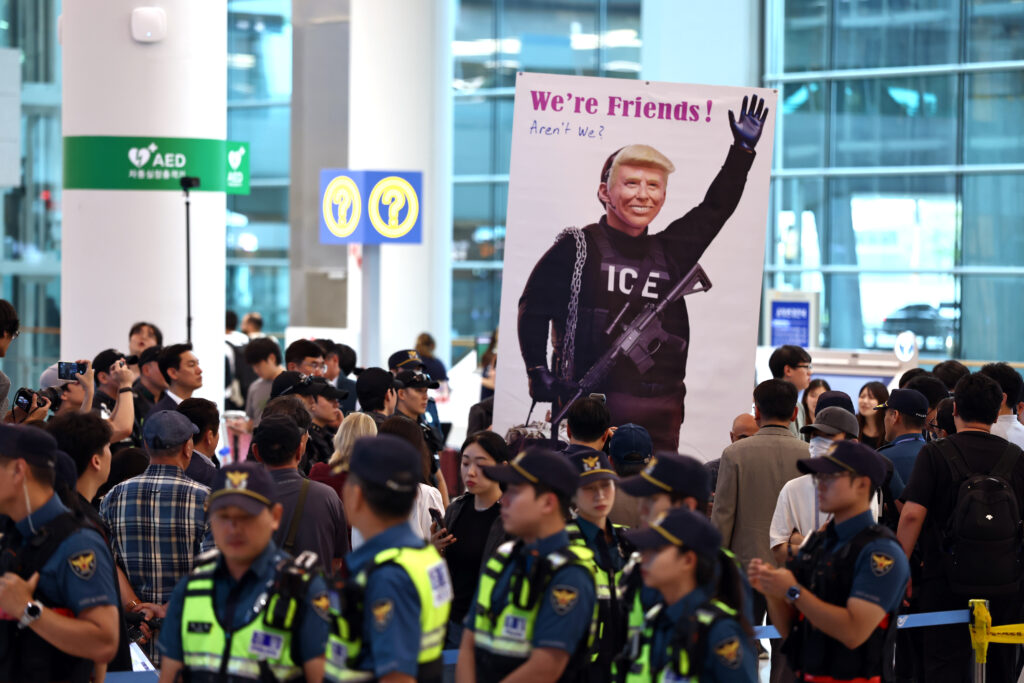
President Donald Trump is trying to smooth things over with South Korea after his administration arrested hundreds of workers at a Hyundai plant in Georgia earlier this month. Just hours after reports indicated that South Korea would open a human rights investigation into the detention of Korean employees, Trump said he doesn’t “want to frighten off” foreign investment into the US — something he has made a priority during his second administration.
On September 4th, Immigration and Customs Enforcement (ICE) agents descended on the electric vehicle battery plant operated by Hyundai and LG Energy Solutions, detaining nearly 500 workers, including around 300 workers from South Korea. ICE officials claimed the workers overstayed their visas or weren’t permitted to work in the US, according to NBC News.
Workers interviewed by The Korea Times say they were “shackled and handcuffed” and then brought to the ICE detention center in Folkston, Georgia, while their belongings and phones were confiscated. It’s not clear whether the workers were even eligible for deportation, as The New York Times reported on Friday that “in at least one instance, officials admitted a worker was employed legally and forced him to leave the country anyway.”
As noted by the Times, many of the workers entered the US on a B1 visa for business travel, allowing them to stay in the US for less than six months, or on a visa waiver program, permitting them to stay for up to 90 days. Some companies use short-term visas instead of H-1B visas, which allow foreign workers to stay in the US for up to six years, because they’re cheaper, faster to obtain, and less restrictive. “Previous US administrations had largely turned a blind eye to the practice,” according to The Guardian.
Trump has called on foreign companies to invest more money into the US to avoid paying costly tariffs. Hyundai responded with the announcement in March that it would spend $21 billion in the US from 2025 to 2028, with plans to expand car production in the US to 1.2 million vehicles each year and improve its facilities. The removal of hundreds of workers could delay these plans, as Hyundai has already pushed back the opening of its Georgia factory.
The raid sparked outrage from South Korean President Lee Jae Myung, who called the move “extremely bewildering” and said companies in the country will be “very hesitant” about pouring more money into the US. South Korea’s security advisor Wi Sung-Lac added that the government would work with the US to carve out clearer guidelines for visa requirements, as well as potentially develop a new category for Korean workers, according to Reuters.
The incident puts the Trump administration on shaky ground with South Korea, which has long remained an ally of the US. In a post on Truth Social, President Trump wrote that he would like to bring foreign workers to the US to “teach and train” employees based in the US. “We welcome them, we welcome their employees, and we are willing to proudly say we will learn from them, and do even better than them at their own ‘game,’ sometime into the not too distant future!”




This is an interesting and complex situation that highlights the challenges surrounding immigration policies and the experiences of foreign workers. It’s important to consider the diverse perspectives involved. Thank you for sharing this update.
You’re absolutely right; the intersection of immigration and labor rights can be quite intricate. It’s also notable how public sentiment can shift quickly, as seen with the protests in South Korea, reflecting their deep connection to these workers. This situation really underscores the global implications of local policies.
is indeed a complex issue. It’s interesting to note how public sentiment can shift rapidly in response to events like the ICE raid, highlighting the broader challenges faced by immigrant communities. This situation not only affects the workers directly involved but also sparks conversations about labor practices and policies on a larger scale.
to events like these. It’s also important to consider how these situations impact the families and communities left behind, not just the workers themselves. The emotional and economic effects can be profound and long-lasting.
Absolutely, the family dynamics can be profoundly affected by such events. It’s heartbreaking to think of the uncertainty and stress that families face when a loved one is suddenly deported. This situation also highlights the broader implications for communities and economies that rely on immigrant labor.
You’re right; it really does impact families deeply. It’s interesting to consider how these raids not only disrupt lives but also highlight the complexities of immigration policies and their effects on communities.
can create a ripple effect, affecting not just the workers but entire communities. It’s also worth noting how these actions often lead to heightened tensions between countries, as seen with the protests in South Korea. The emotional and social implications are significant.
Absolutely, the impact on communities can be profound. It’s interesting to note how such events can shift public perception about immigration and labor, often leading to broader discussions on worker rights and cultural integration.
create a ripple effect, influencing local economies and cultural dynamics. Additionally, the response from the South Korean government may also shape future relations between the two countries, highlighting the broader implications of immigration policies.
That’s a great point about the ripple effect! It’s interesting to consider how the deportation of these workers might not only impact local economies but also alter community relationships and cultural exchanges. The response from both the U.S. and South Korea could shape future immigration policies as well.
workers not only impacts their families but also the local communities they leave behind. Additionally, the response from South Koreans at the airport highlights the global implications of immigration policies. It’s a complex situation that definitely raises important questions about worker rights and international relations.
That’s a great point about the broader impact on local communities. It’s also worth noting how these events can affect the economic stability of the regions involved, as many of these workers contribute significantly to local industries.
protests reflect the deep connections between immigrant workers and their home countries. Many of these individuals contribute significantly to both the local economy and their families back home, creating a complex web of support and dependence. It’s a reminder of the human stories behind policy decisions.
You’re absolutely right; those connections are vital for both the workers and their families back home. It’s interesting to see how the protests not only highlight the struggles faced by these workers but also the broader implications for international relations and labor policies.
I agree, those connections truly play a crucial role in supporting families during tough times. It’s also interesting to see how this situation highlights the broader implications of immigration policies on communities, both in the U.S. and abroad.